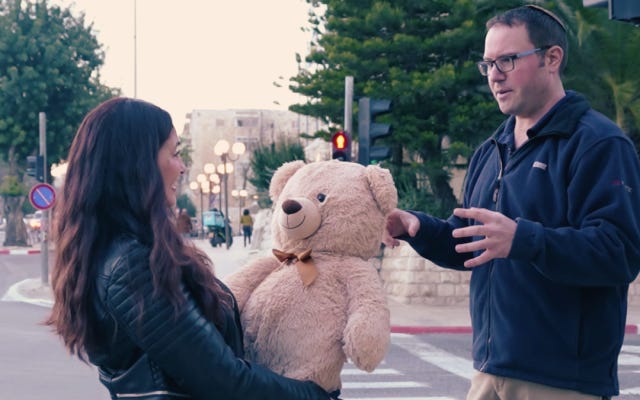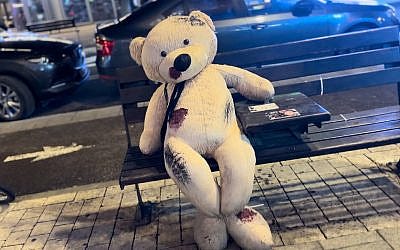The Israelis: Choosing Resilience Over Resignation
“If you came here to survive, you’re in the wrong place. We’re not surviving, we’re cultivating.”
Please consider supporting our mission to help everyone better understand and become smarter about the Jewish world. A gift of any amount helps keep our platform free of advertising and accessible to all.
You can also listen to the podcast version of this essay on Apple Podcasts, YouTube Music, YouTube, and Spotify.
Share this essay using this link: https://www.futureofjewish.com/p/israelis-choosing-resilience-over-resignation
October 7th etched a dark stain on the hearts of Diaspora Jews, reigniting our sense of identity.
As a community leader, that day tested me like never before.
My husband is the rabbi of a vibrant Los Angeles congregation that is home to more than 600 young souls on the cusp of life’s journey.
On the Jewish holiday of Simchat Torah (October 7th) morning, I stepped into the synagogue, burdened by the unfolding tragedy in southern Israel. Most congregants were oblivious to the horror. Amidst the joy of a couple’s upcoming wedding, my tears tainted the celebration, starkly contrasting the love and marriage we were meant to honor.
Instead, we plunged into mourning, singing the mournful tune of Yizkor (a Jewish memorial service), our hearts heavy with grief. In a synagogue where the median age barely reaches 20-something, the loss of parents hits especially hard.
Yet, on that day, our sorrow extended beyond parental loss; it encompassed the potential loss of friends serving in the IDF and those absent from the now-notorious Nova festival. Together, we swayed a tapestry of silk and sandpaper.
As a somatic healer, I’m attuned to how trauma infiltrates not just our minds but our very beings. The question loomed significant that day: Could we dance with our sacred Torah as tradition dictates? Should we?
In February, I embarked on a mental health mission to Israel, a journey of healing and discovery hosted by the organizations MASK, Nefesh, and The United Task Force. Alongside two dozen fellow healers, I sought to offer solace and document the resilience of the Israeli people.
Our first stop set the tone. Anemones dotted the landscape at the Nova festival memorial, red poppies mirroring the blood spilled. The echoes of war reverberated as Israeli rockets shook the earth, vibrating through our bodies like electric currents.
A local farmer-turned-hero, Rami Davidian, recounted his harrowing tale of saving 750 lives that fateful day. His daily pilgrimage to the memorial site speaks volumes, each step a reminder of the burning flesh he once inhaled. In our collective helplessness, we held space, offering solace in our shared tears. Our journey toward healing had begun.
In Tel Aviv, I met Arel Reuvanie, a 10-year-old refugee whose innocence belied the horrors he’d witnessed. Explosions outside his window, uncles lost in the chaos — he bore it all with a resilience beyond his years. Meanwhile, Arye Dobuler comforted displaced children with teddy bears and dolls, a tender gesture amidst the turmoil.
In Beit Shemesh, we witnessed the power of community in action. Psychotherapist Hindie M. Klein donated ice cream and art projects to an after-school program: a lifeline for children with fathers on the front lines. Amidst balloons and Hebrew tunes, their smiles were a beacon of hope in a sea of uncertainty.
Sam Kramer, a mother in Beit Shemesh launched a WhatsApp group called “Israel Good News,” a platform with over 12,000 followers worldwide offering a ray of light amidst the darkness, showcasing stories of unity and resilience, like Basma Hino’s first-ever kosher Druze restaurant feeding Israeli soldiers on the front lines.
“We are a small country, nobody is killed that nobody knows,” commented Sharon Katz, a grandmother whose son was injured on the front lines. Her way of coping is through dance. Her theater company helps women whose husbands are at the front survive their interminable wait.
Donny, a young soldier haunted by his experiences in Gaza, found solace in sound baths and healing sessions. His genuine smile, a rarity since the war, spoke volumes of his newfound resilience.
One of the main goals of Hamas on that dark day was to disrupt the food supply by attacking Thai workers on the farms in southern Israel. According to NPR, more than 7,000 Thai workers left Israel after October 7th. Yoel Zilberman, co-founder of Hashomer Hachadash, has coordinated 2,000-to-5,000 volunteers daily arriving from around the world to cultivate the fields.
A beacon of hope amidst despair. For him, survival was not enough; Israel must thrive, a testament to the indomitable human spirit.
In Jerusalem, Levi Saada’s “Hineni” organization brought healing through communal song circles. Their collective spirit, a balm for wounded souls, epitomized the power of unity in adversity.
On October 7th, amidst the darkness, my husband boldly decided that we would dance with the Torah. It was not a celebration but a declaration — a testament to our unyielding spirit and refusal to succumb to despair. Our dance became a battle cry, a reaffirmation of our values and our resilience in the face of evil.
So, what defines the resilient spirit of the Israeli people? It is a story of courage, compassion and community. It is a testament to the human capacity for healing and hope, even in the darkest times. Post-October 7th, Israel is not merely surviving; she is thriving — a beacon of resilience in a world of turmoil. A seed destroys itself to emerge as a tree. As Yoel Zilberman once said:
“If you came here to survive, you’re in the wrong place. We’re not surviving, we’re cultivating.”
In adversity, Israelis choose growth over stagnation and resilience over resignation. From the depths of tragedy, they emerge more muscular, more determined than ever to cultivate a brighter future.
Walking through Tel Aviv’s streets, I noticed large teddy bears lining the sidewalks. Blood stained, gagged and filthy, they were a stark reminder of the violence perpetrated on October 7th.
People throughout the city bustled, circulating through their daily routines. I stood frozen at the life-sized teddy bears lining the popular Dizengoff Street as a constant reminder of Hamas hostages’ suffering. As I gazed upon the anguish, I wondered how many moments I would experience the resilient spirit of moving through it.
“We have no choice,” was the constant Israeli sentiment on my trip. There was an overall attitude of “keep moving forward.” However, there is moving and there is moving. Israelis don’t just move, they empower and elevate.
Arye Dobuler retired from reserve duty four months before October 7th after 20 years in the IDF.
Already 40 and aged out, he still called his commander to let him know his bags were packed and he was ready for duty. At the time, Arye was no longer required to serve in the field as his unit had been dissolved. Still, Arye was a man of action, and decided to figure out a different way to contribute.
His attention shifted to easing the evacuation of Israelis into hotels when he saw the rush of refugees flooding Jerusalem. Conducting his own reconnaissance mission, he began to observe what supplies were missing and needed.
The requests began to pile up, and so his operation began. He had diapers, feminine hygiene products, clothing, toys, books, games, and even food distributed. Bar and Bat Mitzvah celebrations were coordinated along with birthday parties.
He worked tirelessly to ensure that the refugees had everything they needed and that their stay was as comfortable and enjoyable as possible. He was a beacon of hope in a chaotic situation.
During the first three weeks after the initial rush of basic supplies had slowed down, Arye shifted his focus to meeting the emotional and psychological needs of the displaced population, which led to the launch of “Operation Teddy Bear Hug.”
“Somebody had donated a giant doll,” he said. “And I said this teddy bear has a higher purpose. This teddy bear is gonna go around and make a lot of people happy.”
Arye’s life-size white teddy bear was similar to the ones I saw all over Tel Aviv, but with rosy cheeks and a healthy appearance. He began to make the rounds. Soldiers, children, and parents embraced the teddy bear.
But over time, Arye wanted to create more opportunities for children to have the ongoing gift of the teddy bear. To date, Arye has graced over 30 hotels, bearing a sack brimming with teddy bears, dolls, and gentle creatures, bringing solace to children, like soft whispers in the night, offering love’s soothing embrace to those in need, amidst shadows’ plight.
“I never go to somebody with a doll and say, here, give a hug,” he said. “Rather, I set it up nicely. I have a little sign that says, come make the bears happy … give them a hug. And if they want to come to me, they can do that. I don’t impose. They’re sitting in the lobby. They’re enjoying nice quiet time in their own little bubble.”
Arye took me to one of the hotels to set up his “shop.” In mere moments, eager children began to select their cherished dolls, guided by curiosity’s gentle hand. His entire doll collection was dispersed. I could see a real shift in their eyes, not just in the children but also in their parents.
The stark contrast between wounded teddy bears abandoned on park benches, drenched in the rain and splattered with red blood stains, and the intact dolls Arye gave out as gifts made me realize that Israel is not just a place where conflict happens.
It is also a place where healing and love are spread abundantly.
Versions of this essay also appeared in the Jewish Journal and The Times of Israel.



You would have returned to an LA where pro Hamas demonstrations to intimidate Jewish congregations are condoned by the Mayor.
Wouldn't a more appropriate response be to demand that the entire congregation obtain firearms licenses?
https://magenam.com/
https://jewscanshoot.org/
Thank you Chava. Beautiful and inspiring. There must be some part of my DNA that connects me to Israel 🇮🇱. As I read your article, I felt my hair rising in goosebumps and a stirring ache in my soul, a need to be there. Oct 7 caused a shift in humanity's hearts and souls - some good and some bad. Your words brought tears, a smile and laughter. I can see the dancing and singing as the Jewish people do - rain, snow, sunshine, celebration, mourning and just life. Your people make the world a better place. Thank you Israel! - Am Yisrael chai